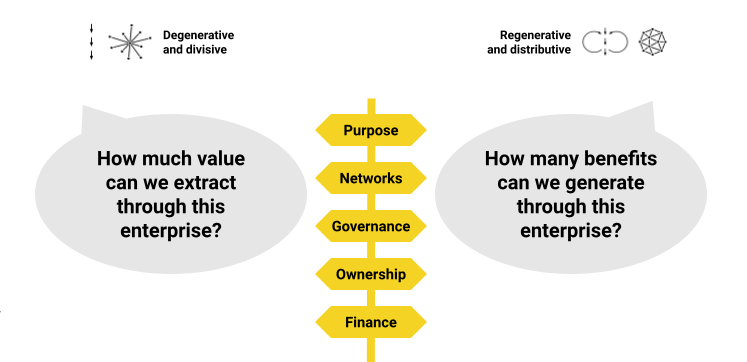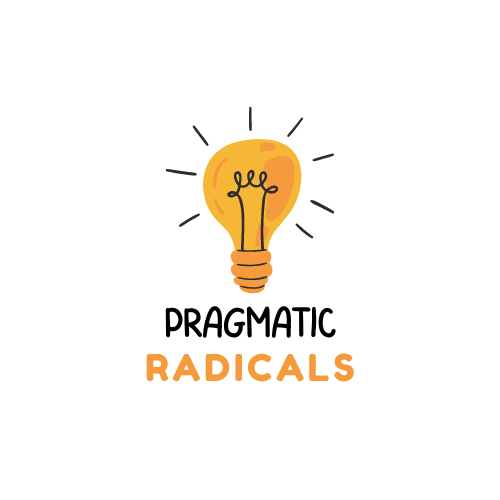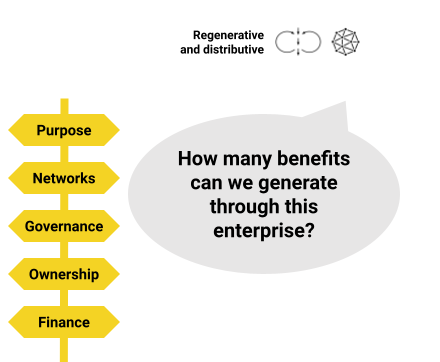
My daughter loves doughnuts. So it wasn’t hard to convince her to come along to an event last October that was inspired by them. Well, inspired by Doughnut Economics (there were no doughnuts at the event but luckily there were croissants so all good). The event was hosted by CIVIC SQUARE and it popped up on my socials just as I was beginning to explore freelance life.
Stepping down from a busy CEO role and launching my own consultancy practice in autumn last year, I wasn’t sure of my final destination. I was clear that I wanted to work on social impact work rooted in equity and justice. Many insightful, interesting conversations and coffees with friends, collaborators and potential clients in recent months have also helped me to become a lot clearer on what I’m good at, what I’m passionate about, and where and how I want to co-create impact. I’ve not got all the answers figured out yet, but the time to reflect that this transition to freelance life has afforded me has been invaluable. It’s also got me thinking afresh about the role that we all play – whether as CEOs, as consultants or simply as citizens and neighbours – in creating the conditions for humanity to thrive in the 21st century.
So yes, I’ve been reading about regenerative futures, inspired like many others by Kate Raworth’s Doughnut Economics. This framework describes the social foundation and planetary boundaries within which people and planet can thrive. I’m inspired in equal measure by those who are experimenting with putting her theories into practice at the level of the neighbourhood. Immy Kaur and the incredible team at CIVIC SQUARE are doing exactly this in Ladywood, Birmingham where they live and breathe the distributive and regenerative principles of Doughnut Economics. I was delighted to have the opportunity to work with them at the end of last year to support the curation and editing of a landmark report, a Neighbourhood Portrait of Place. I was struck by the generosity with which they are sharing their learning, and the care they are putting into documenting their practice for the benefit of others. There are so many more exciting projects I’ve come across this past year, too many to mention. Centric Lab’s work on equitable access to healthcare by design and Amna’s work supporting the psychosocial wellbeing of refugees and other displaced communities standout as other exciting examples of really smart, transformative work.
A hopeful, pragmatic highlight of my reading was Nomad Century by Gaia Vince. Climate-related migration hasn’t had the attention it needs on the global stage, nor have (negative) attitudes to migration been sufficiently challenged and rebalanced. Yet, there are reasons for hope. From high profile media personalities with refugee backgrounds to the quiet guy in the support team at the local refugee and migrant centre where I volunteer, from TERN’s refugee entrepreneurs to the new Experts by Experience Employment CIC, people with lived experience everywhere are changing the narrative around migration. A core part of my commitment to equitable and just planetary balance is the belief that human migration is a natural and mutually beneficial phenomenon, not the crisis that our mainstream media and politicians would have us believe.
All of this led me to ask myself how my own consultancy practice can model regenerative practices and contribute to creating safe and just spaces for all? I know it’s a freelance, self-employed gig not an institution employing thousands but we each carry responsibility to show up in whatever ways we can. So how do I ensure that my commitment to people and planet shows up in the way I structure and design my work, the way I work with clients, partners and collaborators, and the way that I share tools, resources and ideas? The Doughnut Economics Action Lab offers an organisational design template for organisations and consultancies thinking about this, which I’ve used to structure my ideas and hold myself accountable for how my practice, Pragmatic Radicals, can play its tiny little part in living the principles of regenerative and distributive practice.
Purpose: I created Pragmatic Radicals with the aim of contributing to transformational change in the ways organisations work – with their own teams, within their networks, and within their wider ecosystems – to realise systemic change, reduce inequity and improve wellbeing for people and planet. In the coming year, I challenge myself to promote the boldest and most transformative solutions in my work with clients from large to small; settling for marginal changes that uphold the status quo may be more comfortable but it does not serve my clients or the communities that they work with in the long run.
Networks: I work exclusively with organisations who share a commitment to sustainable and ethical social impact work rooted in equity and justice. I am agnostic about the types of entity I work with – charity, social enterprise, foundation, academia, purposeful business, public sector – each has their role to play, but values alignment is non-negotiable. Whilst my career to date has been spent working internationally, I am instinctively seeking out projects that are more ‘local’ whilst recognising their interconnectedness with the ‘global’. In the coming year, I challenge myself to establish a form of due diligence process which builds on that gut feeling you get about potential clients and ensures that values alignment is central to the way that I build up my portfolio.
Governance and power: As a sole trader I don’t have a Board of Directors, nor employees. But I do actively seek out mentors, mentees, collaborators and advisors (only occasionally resorting to my cat as a sounding board on quiet days in front of the laptop!) I aim to prioritise kindness and reciprocity. I am deeply focused on how voice and power show up in my collaborations, aware of the privilege that I hold as an external facilitator or advisor. In the coming year, I challenge myself to not only centre the voices of people with lived experience in the projects I take on, but to actively and directly collaborate with leaders and consultants who have lived experience in co-creating these transformation projects, exploring co-leadership models in the process. I’m excited to delve into this amazing resource Feminist Co-Leadership curated by Devi Leiper O’Malley and Ruby Johnson which maps out the complexities and rewards of shared leadership.
Ownership: working in the non-profit sector for my entire career, prioritising purpose rather than extracting profit is in the DNA of Pragmatic Radicals. Whilst I’m not currently thinking about associates or sub-contractors, I’m constantly inspired by social enterprise, cooperative and co-ownership models. In the coming year, I challenge myself to be distributive in my stewardship of resources (financial capital as well as other forms of capital) and to make responsible, sustainable choices in suppliers in my (small) supply chains. In the coming year, I challenge myself to provide clients with fair and transparent quotes, ensure that everyone involved in a project is compensated fairly, choose suppliers with sustainable social and ecological credentials wherever possible, and minimise air travel. I will also continue to play a part in my neighbourhood’s circular economy (not least by taking in unwanted books and clothes whilst finding new homes for the things we no longer have use for in our household!)
Finance: I will grow Pragmatic Radicals if and where I see opportunities to scale the impact of the work. I won’t grow it for the sake of my own ego. Degrowth is gaining momentum as a concept which rejects all growth as inherently ‘good’, summed up in the social investment context in this short explainer by Lucy Findlay What is Degrowth? | Good Finance. I’m really just starting out, so this is not about shrinking my budding enterprise. It is rather about growing in ways which are financially viable whilst bringing ever greater benefit to people and planet; this may involve substantial increases to revenues but it might just as well involve catalysing and influencing the actions of other, much bigger actors in the ecosystem. In the coming year, I challenge myself to develop Pragmatic Radicals in ways that balance financial viability with sustainable impact – seeking out projects that have transformative potential which can later be leveraged by others.
Tools: This Organisational Principles of Practice tool (and related organisational design questionnaire) – which has given structure to the thinking in this blog – is the very first one I’m using from the Doughnut Economics Toolkit! DEAL recently took this a step further, launching a brilliant new resource Doughnut Design for Business (and from which I sourced the cover picture for this blog). From my work with CIVIC SQUARE editing their Neighbourhood Portrait toolkit late last year, itself drawing upon the Doughnut Economics Action Lab tools, I was inspired by how adaptable these resources are for use in diverse settings – with organisations, with communities, even with children in (outdoor) classrooms. I am excited to get stuck in, and indebted to those whose hard work and generosity in sharing resources enable me to build on the work that has gone before. Whilst writing this I also came across Maurice Mitchell’s insightful piece Building Resilient Organizations exploring what holds us back and what we can do to acknowledge power and nurture collective action for lasting social change. I’ll also be channelling his insights into my work in the coming year as I experiment, learn and adapt, mindful of the wider systems within which we are all operating. In the coming year, I challenge myself to be equally open and generous in sharing my thinking, my resources and my time.
For me, writing blogs is a way to hold myself to account. It’s something I began doing more consistently in my first significant leadership role back in 2018, mainly on LinkedIn. I would love it if this blog also prompts just one or two more people to consider how they approach their work through the regenerative and distributive lenses of Doughnut Economics. None of what I’ve written above is particularly radical. But if we all started working in this way, we would create a radically different world.
Please do reach out if you like what you have read and think that we would work well together on whatever knotty challenge is keeping you awake at night. You’re not alone.

